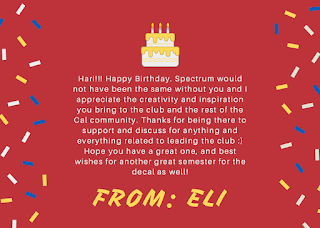I was keynote speaker at Able-SC's Transition Conference
Empowering a Future is a professional development opportunity for educators and service providers working with youth with disabilities who are transitioning to adulthood. This year's conference will include all the exciting sessions you're used to - but in a user-friendly online format! Want to learn how to motivate and empower your students? It's time to leave the deficits-based approaches behind and focus on new strategies to build strong, successful self-advocates. Session content will highlight virtual service delivery, supported decision-making, pre-employment transition services, youth leadership, and much more.
“Being branded low [functioning] sets you up for low educational expectations, low societal expectations and gatekeeping from the get go, it sets you up for lifelong failure. No one willingly labels themselves as low, it is others doing so.”
We are so excited for Hari Srinivasan to be our keynote speaker at
Empowering a Future 2021! Teachers, service providers and counselors: learn directly from an autistic student and disability scholar about how to empower students with disabilities. Tickets:
bit.ly/eaf2021















.jpg)























